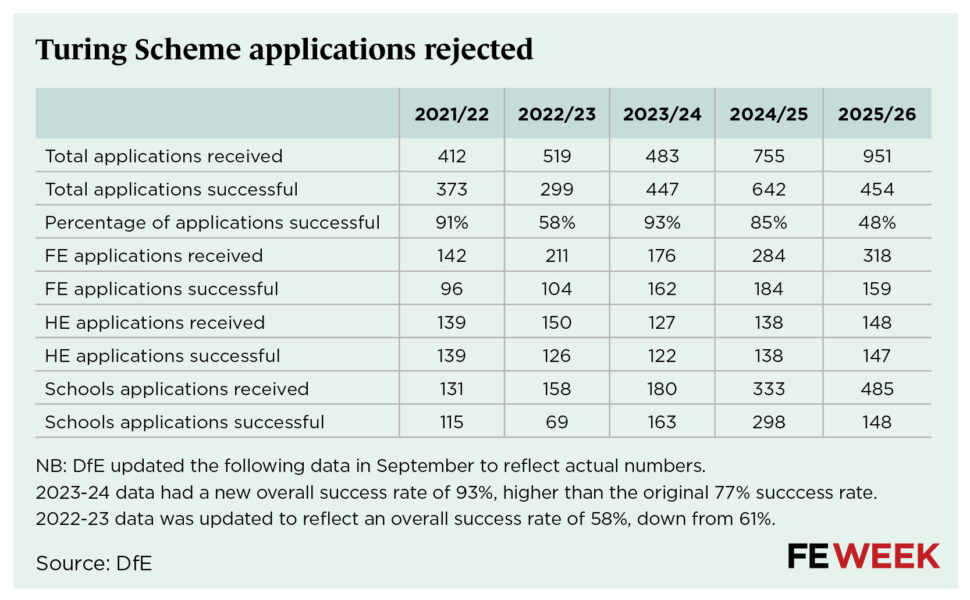A record-breaking number of applications to the Turing Scheme were rejected by the government this year following a spike in interest ahead of the programme’s expected closure.
Latest data reveals that bids from education providers to organise international trips for young people soared to 951 in 2025-26 – but just 454, or 48 per cent, were accepted.
In 2021-22, the programme’s first year, 91 per cent of 412 applications were granted. The proportion of successful bids fell to 61 per cent of 520 requests the next year, before hitting 77 per cent of 619 bids in 2023-24, and then 85 per cent of last year’s 755 applications.
The Turing Scheme was supposed to end last year but the government agreed to a one-year extension. However, the total funding pot was trimmed by nearly a third to £78 million as part of the Department for Education’s cost-cutting spree.
Figures published this week show the government even underspent this reduced budget by over £4 million despite record numbers of applications.

‘Shorter mobility’ for FE students
The data shows applications from further education providers rose to 318 this year, but half were rejected. It means just £24 million in Turing cash has been handed out to FE providers in 2025-26, a 28 per cent cut from the previous year.
DfE acknowledged the lower success rate of applications, but said it funded successful applications in full as well as appealed bids to ensure providers can deliver the projects they applied for.
The DfE also limited the maximum funding pot available per FE provider application to £205,000 and has almost halved daily living costs for students going abroad this year. DfE said it placed the limit to avoid stretching the available funding across many providers and increase the risk of providers not being able to deliver their intended placements.
It also said where providers applied for funding above the cap, the applications were scaled down to the cap.
This funding cut and low approval rate means around 11,000 FE learners and apprentices will go on a trip this year, a 6 per cent fall from last year.
Richard Lloyd, co-founder of Further Afield, an initiative that arranges trips with FE providers, said funding pressures were resulting in “shorter mobility” placements across the board. He said: “It can sometimes mean experiences feel more like short group trips rather than the longer, more independent exchanges traditionally associated with study abroad.”
Erasmus+ return?
Named after the mathematician and code-breaker Alan Turing, the DfE-funded initiative replaced Erasmus+ in March 2021 with a new focus on social mobility. The then education secretary Gavin Williamson also allowed trips to be made outside the EU.
Figures show FE providers continued to target more disadvantaged students despite dipping into a smaller funding pot. Two thirds of FE participants going on a Turing trip this year are from a disadvantaged background, compared with 59 per cent in 2024-25.
Schools have ramped up their social mobility efforts too, with around 82 per cent of all school placements being handed to students from deprived backgrounds, up from 56 per cent the previous year.
But universities bucked the trend with their share of disadvantaged students on Turing trips rising just 2 per cent to 52 per cent of all 18,826 participants.
No funding has been announced to continue the Turing Scheme next year. In May, skills minister Jacqui Smith said the government had begun negotiating to “work towards” rejoining Erasmus+.
The DfE was approached for comment.
















Your thoughts